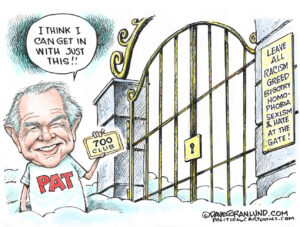How a War on Porn Is Endangering US Sex Workers
Anti-sex-trafficking organizations are imposing their extreme religious views on all Americans. Protests in Las Vegas against the Fight Online Sex Trafficking Act and the Stop Enabling Sex Traffickers Act. Photo: John Locher / AP.
Protests in Las Vegas against the Fight Online Sex Trafficking Act and the Stop Enabling Sex Traffickers Act. Photo: John Locher / AP.
An ‘anti-trafficking’ US law that has been accused of endangering sex workers faces a crucial hearing this week.
The Fight Online Sex Trafficking Act and Stop Enabling Sex Traffickers Act (FOSTA/SESTA), which became law in 2018, claims to hold websites liable for promoting or facilitating prostitution or sex trafficking.
But critics say it has actually increased trafficking, as well as threatening sex workers and free speech.
Under the law, a website can be sued if a user discusses prostitution or sex trafficking – and the site’s owner can be sentenced to up to 25 years in prison. This means some platforms have introduced bans on all content relating to sex work.
Former sex worker and sex-trafficking survivor Justice Rivera told openDemocracy that this is “pushing people to more risky forms of work, like full-service sex work, or something that’s on the street”.
Woodhull Freedom Foundation, an organization that defends sexual freedom as a fundamental right, first sued the federal government over the law in June 2018.
The foundation argued that FOSTA/SESTA violates the first amendment, which protects freedom of speech. But a court dismissed the case months later, ruling that Woodhull and its co-plaintiffs, Human Rights Watch and online civil liberties group Electronic Frontier Foundation, had no legal standing.
This decision was overturned by the Court of Appeals in January 2020, and last March a court ruled in the government’s favor. Woodhull is now appealing that decision, and the Court of Appeals will hear the case on 11 January.
Sex workers’ groups say they were not given a chance to present their views on FOSTA-SESTA before it became law.
A 2020 study of the effects of FOSTA/SESTA found that 72.5% of sex workers had faced economic instability since the law’s introduction.
In San Francisco, the number of street-based sex workers tripled in 2018 and there was a 170% increase in human trafficking cases. CBS said both spikes appeared “to be connected to the federal shutdown of sex-for-sale websites”.
This increased hardship is because websites that sex workers previously advertised on have been shut down, including Craigslist personals, as have websites that were used to verify clients’ identities.
Similarly, in July 2018, police in Indianapolis admitted they were having more trouble finding sex trafficking victims because sites used by pimps have been taken down.
Sex workers’ groups say they were not given a chance to present their views on FOSTA-SESTA before it became law.
Mike Stabile of the Free Speech Coalition, an adult industry trade group, told openDemocracy that “the adult industry would love to work with the government to find solutions”.
In passing the legislation, Congress also overlooked a letter from US assistant attorney general Stephen E Boyd, who raised a “serious constitutional concern” over the fact that FOSTA/SESTA retroactively criminalizes actions that weren’t illegal when committed. Boyd also warned the law would make it harder to prosecute traffickers.
Woodhull’s lawyer, Lawrence Walters, told openDemocracy that those backing the legislation, including several Christian groups, realized that “online adult entertainment is constitutionally protected, so they weren’t going to convince Congress to censor that”.
He continued: “But if they created these enormous penalties for anything associated with that kind of content… that’s an awfully good way to get porn off of the internet.”
The result has created a loophole in the Communications Decency Act, which shields websites from being liable for what users post. Walters says this has had a chilling effect on free speech, with social media giants moving to ban all sex work-related content.
Only a few cases have been brought under FOSTA/SESTA, with only one criminal conviction so far. The owner of CityXGuide, where thousands of sex workers advertised, was in November sentenced to eight years in prison and ordered to forfeit $15m in assets after two teenage trafficking victims were identified on the site.
A case has also been brought against Twitter, by the National Center on Sexual Exploitation and two teenagers. The co-plaintiffs say the site initially failed to remove a tweet sharing a video of a 13- and 14-year-old engaged in sexual activity. The case has not yet been settled, with Twitter arguing that it cannot remove all such content immediately due to the “sheer volume” of tweets posted every day and that FOSTA/SESTA applies only to “openly malicious actors”.
Staff at Woodhull are worried that their website could be subject to the law for discussing sex workers’ rights.
Exodus Cry is indeed well-funded, receiving more than $2.5m in donations in 2021, including from prominent Christian foundations
Among the most influential groups to lobby for FOSTA/SESTA were Exodus Cry and the National Center on Sexual Exploitation, both of which have links to anti-abortion and anti-LGBTIQ causes.
Exodus Cry is a California-based Christian non-profit advocacy organization, which claims to “fight for the freedom of all sex trafficking victims” and seeks the abolition of the commercial sex industry, including online pornography and strip clubs.
The organization was founded in 2008 by Benjamin Nolot, who tweeted in 2013 that “abortion is largely about finding a ‘solution’ for irresponsible gratuitous recreational sex, not ‘women’s rights’.”
In an email to openDemocracy, Exodus Cry’s former director of abolition and founder of TraffickingHub (a campaign created by Exodus Cry) and the Justice Defense Fund, Laila Mickelwait said that the organization is not ‘anti-porn’.
She said: “I do want to note and clarify that not I, nor the Traffickinghub movement, nor the Justice Defense Fund, are ‘anti-porn’. Rather, we aim exclusively to stop criminal nonconsensual content such as child abuse, rape, sex trafficking and illegal image-based sexual abuse.”
However, Exodus Cry’s data has previously been found to be unreliable. In 2012 it claimed – falsely – that 300,000 children in the US are at risk of being trafficked, or that on average girls get into prostitution at 13 or 14 years old, also a debunked claim.
Data on trafficking is often incorrect or exaggerated. In 2015, Republican congresswoman Ann Wagner wrongly claimed that human trafficking is a $9.5 billion industry in the US, and in 2018 Democrat congresswoman Sheila Jackson Lee claimed there were 79,000 victims of sex trafficking in Texas, likely to be an inflated figure given the National Human Trafficking Hotline identified 1,001 cases in the state that year.
Justice Rivera, who helped to collect data for a group that supports FOSTA-SESTA, which she asked openDemocracy not to name, says the methodology used by some anti-trafficking groups is flawed.
“Anyone I encountered, we had to count as a victim of trafficking. It didn’t matter if I was just seeing them on the street and they were doing sex work, or they were homeless youth.
“If I encountered them, checkmark, they’re a victim of trafficking—so we can keep getting our funding. And that’s the whole field,” said Rivera, who later resigned from the organization.
Exodus Cry is indeed well-funded, receiving more than $2.5m in donations in 2021, including from prominent Christian foundations, according to filings to the Internal Revenue Service. It also received $117,300 in government grants.
Similarly, the National Center on Sexual Exploitation (NCOSE) received $4.8m last year, including $204,392 in government grants.
Like Exodus Cry, the NCOSE—formerly known as Morality in Media—is a conservative non-profit with anti-exploitation and anti-pornography aims, which successfully lobbied Visa and Mastercard to block payments using their cards on pornography website PornHub.
Sex trafficking and consensual sex work are one and the same, according to the NCOSE, which stated in a 2017 amicus brief that “the majority of prostituted persons should be classified as victims of sex trafficking”.
Patrick A Trueman, the NCOSE’s leader, is a former obscenity chief at the Department of Justice. Trueman has also worked for the American Family Association and the Family Research Council, both of which are designated anti-LGBTIQ hate groups by the Southern Poverty Law Center.
NCOSE’s CEO Dawn Hawkins believes fighting porn is a “calling from God” spurred from her time proselytizing for the Mormon church in Hungary, while its board chairman, Ron DeHaas, is president and co-founder of Covenant Eyes, a company that produces pornography-monitoring software primarily for a Christian audience. Another board member, political scientist Hadley Arkes, has said that gay conversion therapy proves that homosexuality is unnatural.
In an email to openDemocracy, the NCOSE said it is “nonpartisan and nonsectarian because the fight for human dignity knows no political or religious boundaries”. It added: “NCOSE came under new leadership in 2010 and rejects any hateful speech or conduct toward LGBT+ or other marginalized groups.”
Politicians in Utah, Texas and Florida have already been banning LGBTIQ+ books that they deem pornographic in public schools.
Leo Vice, a Taiwan-born adult performer, started making porn full-time when he was laid off from his job in the video game industry during the pandemic.
When PornHub stopped accepting major credit cards for its premium memberships in early 2021, following Visa and MasterCard’s withdrawal, Vice, like many in the industry, turned to another outlet: OnlyFans.
He told openDemocracy: “That kind of became the replacement for people. But the way OnlyFans works, it still doesn’t have the same level of reach the way Pornhub does.”
Soon, OnlyFans became a target of the NCOSE, which urged the Department of Justice to take action against the site and pressured credit card companies to stop allowing payments to the site.
More than 100 members of Congress sent a letter to attorney general Merrick Garland on 10 August 2021, asking him to investigate the site.
Ten days later, OnlyFans announced it would remove sexual material from the site – a decision it reversed the following week after widespread backlash.
“When they started attacking OnlyFans with the same playbook, a lot of the performers were able to get in front of it,” Vice said. Critics “were able to paint the picture of Pornhub as an evil corporation, where they weren’t able to do the same thing for OnlyFans because we as performers were humanized.”
Mike Stabile of the Free Speech Coalition isn’t surprised by the fight against the commercial sex industry. He explained: “Porn is by nature political… because it challenges the family, challenges heteronormative views, challenges our ideas of gender.”
These groups’ leverage doesn’t come from influence and money alone, he said, but also the shame associated with porn.
“There are not people in Congress who are willing to stand up and say porn is a perfectly fine piece of entertainment,” Stabile explained. “You’re not going to have Joe Biden say, ‘Oh, it’s fine to jerk off’… So they … allow the demagogues to really control the conversation.”
The fight against porn is not just about porn or sex, according to Ricci Joy Levy, president and co-founder of the Woodhull Freedom Foundation. Sex is the target because it’s an easy one.
“When we see this level of censorship, the only speech that will be left will be government speech, which is what we see in fascist countries,” said Levy.
She and Stabile said that anti-porn laws, anti-trans and book-banning laws are all connected. The NCOSE wants to restrict what children can read, with EBSCO (a database of educational materials for school children) and the American Library Association previously featuring in its annual ‘Dirty Dozen’ lists of “mainstream entities for facilitating, enabling, and even profiting from sexual abuse and exploitation”.
Politicians in Utah, Texas and Florida have already been banning LGBTIQ+ books that they deem pornographic in public schools. Lawmakers are also equating discussions of transgender identity in schools with pornography.
Legislating on sex is not just happening in the US. Levy mentioned the new Indonesian law that criminalizes sex outside of marriage. “You can’t look at this across the whole world and say, this is just about adult entertainment. It’s about controlling our bodies, our personal autonomy,” she said.
Vice agrees. “We keep painting a picture of how perverse and horrible porn is and how it’s destroying Western society. But let’s look at some of those places [that restrict porn] like Saudi Arabia, and let’s see how equal and free people are in these places. It doesn’t exactly seem like getting rid of porn makes people free over there, you know?”
Your support matters…Independent journalism is under threat and overshadowed by heavily funded mainstream media.
You can help level the playing field. Become a member.
Your tax-deductible contribution keeps us digging beneath the headlines to give you thought-provoking, investigative reporting and analysis that unearths what's really happening- without compromise.
Give today to support our courageous, independent journalists.






You need to be a supporter to comment.
There are currently no responses to this article.
Be the first to respond.